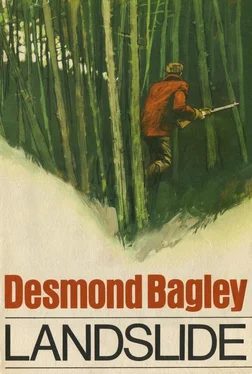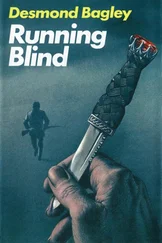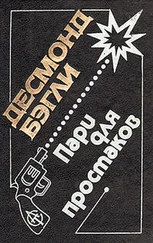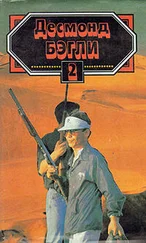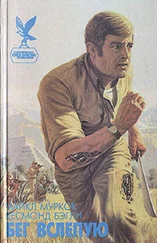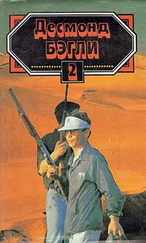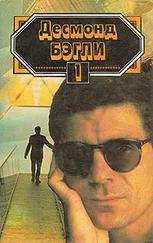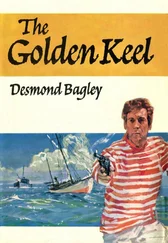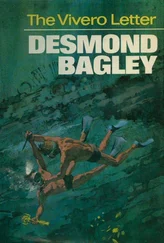I rested up frequently but not for long each time — about five minutes in the hour. More than that would have tightened my leg muscles and I needed to keep limber. I didn’t even stop for long at midday, just enough to change my socks, wash the others in a stream and pin them to the top of my pack to dry out while I was on the move. I filled my water canteen and pressed on north.
Two hours before sunset I began to look round for a place to camp — a nice secluded place — and found one on top of a rise where I had a good view into valleys on both sides. I shucked my pack and spent half an hour just looking, making sure there was no one around, then I undid the pack and produced from the bottom my own personal survival kit.
In the North-West Territories I had been in the wilderness for months at a time, and since rifle ammunition is heavy to carry, I had tended to conserve it and find other ways of getting fresh meat. The little kit which I carried in an old chocolate tin was the result of years of experience and it always lived in the bottom of my pack ready for use.
The jack-rabbits come out and play around just before sunset, so I selected three wire snares, carefully avoiding the fish-hooks in the tin. I once stuck a fish-hook in my finger just at the start of a season and ignored the wound. It festered and I had to come into a trading-post before the season was halfway through with a blood-poisoned finger the size of a banana. That little prick with a hook cost me over a thousand dollars and nearly cost me my right hand so I’ve been careful of fish-hooks ever since.
I had seen rabbit trails in plenty so I staked out the three snares, then collected some wood for a fire, selecting small dead larch twigs and making sure they were bone dry. I took them back to camp and arranged them so as to make a small fire, but did not put a match to it. It would be time for that after sunset when the smoke would not be noticeable, little though it would be. I found a small birch tree and cut a cylinder of bark with my hunting knife, and arranged it around the fire as a shield, propping it up with small stones so as to allow a bottom draught.
Half an hour after sunset I lit the fire and retreated a hundred yards to see the effect. I could see it because I knew it was there, but it would take a man as good as me or better to find it otherwise. Satisfied about that, I went back, poured some water into a pannikin and set the mushrooms to boil. While they were cooking I went to see if I had any luck with the snares. Two of them were empty but in one I had caught a half-grown doe rabbit. She didn’t have more than a couple of mouthfuls of flesh on her but she’d have to satisfy me that night.
After supper I did a circuit of the camp, then came back and risked a cigarette. I reckoned I’d come nearly thirty miles heading due north. If I angled north-west from here I should strike the Kinoxi Valley in about fifteen miles, hitting it about a third of the way up just where Matterson’s logging camp was. That could be dangerous but I had to start hitting back. Prowling around the edges of this thing was all very well but it would get me nowhere at all; I had to go smack into the centre and cause some trouble.
After a while I made sure the fire was out and went to sleep.
I topped a rise and looked over the Kinoxi Valley at just about two o’clock next afternoon. The new Matterson Lake had spread considerably since I had seen it last, and now covered about one-third of its designed extent, drowning out the wasteland caused by the logging. I was just about level with the northernmost point it had reached. The logged area extended considerably farther and stretched way up the valley, almost, I reckoned, to the Trinavant land. Matterson had just about stripped his land bare.
As the logging had proceeded the camp had been shifted up-valley and I couldn’t see it from where I was standing, so I dipped behind the ridge again and headed north, keeping the ridge between me and the valley bottom. Possibly I was now on dangerous ground, but I didn’t think so. All my activities so far had been centred on Fort Farrell and on the dam which was to the south at the bottom of the valley.
I put myself in Howard Matterson’s place and tried to think his thoughts — a morbid exercise. Boyd had caused trouble in Fort Farrell, so watch it — we nearly caught him there and he might try for it again. Boyd was interested in the dam, he was drilling there — so watch it because he might go back. But Boyd had never shown much interest in the Kinoxi Valley itself, so why should he go there?
I knew what I was going to do there — I was going to raise hell! It was ground I had prospected and I knew all the twists and turns of the streams, all the draws and ravines, all the rises and falls of the land. I was going to stick to the thick forest in the north of the valley, draw in Howard’s hunters and then punish them so much that they’d be afraid to push it further. I had to break this deadlock and get Howard in the open.
And I thought the best place to start raising hell was the Matterson logging camp.
I went north for four miles and finally located the camp. It was situated on flat ground in the valley bottom and set right in the middle of the ruined forest. There was too much open ground around it for my liking but that couldn’t be helped, and I saw that I could only move about down there at night. So I used the remaining hours of daylight in studying the problem.
There didn’t seem to be much doing down there, nor could I hear any sounds of activity from farther up the valley where the loggers should have been felling. It looked as though Howard had pulled most of the men away from the job to look for me and I hoped they were still sitting on their butts around Fort Farrell. There was a plume of smoke rising from what 1 judged was the cookhouse and my belly rumbled at the thought of food. That was another good reason for going down to the camp.
I watched the camp steadily for the next three hours and didn’t see more than six men. It was too far to judge really properly but I guessed these were old-timers, the cooks and bottle-washers employed around the camp who were too old or not fit enough to be of use, either in logging or in chasing Bob Boyd. I didn’t see I’d have much trouble there.
I rubbed my chin as I thought of the consequences of Howard’s action and the conclusions to be drawn from them. He’d pulled off his loggers at full pay to search for me, and that was wasting him an awful lot of time and money. If he didn’t get them back on the job it might be too late to save the trees — unless he’d opened the sluices on the dam to prevent the lake encroaching any farther up the valley. But even then he’d be running into financial trouble; the sawmill must have been geared to this operation and the cutting off of the flow of raw lumber from the valley would have its repercussions there — if he didn’t get his loggers back to work pretty soon the sawmill would have to close down.
It seemed to me that Howard wanted me very badly — this was another added brick in the structure of evidence I was building. It wasn’t evidence in the legal sense, but it was good enough for me.
Towards dusk I made my preparations. I took the blankets from the pack and strapped them on the outside and, when it was dark enough, I began my descent to the valley floor. I knew of a reasonably easy way and it didn’t take long before I was approaching the edge of the camp. There were lights burning in two of the prefabricated huts, but otherwise there was no sign of life beyond the wheezing of a badly played harmonica. I ghosted through the camp, treading easily, and headed for the cookhouse. I didn’t see why I shouldn’t stock up on supplies at Howard’s expense.
Читать дальше
Конец ознакомительного отрывка
Купить книгу
